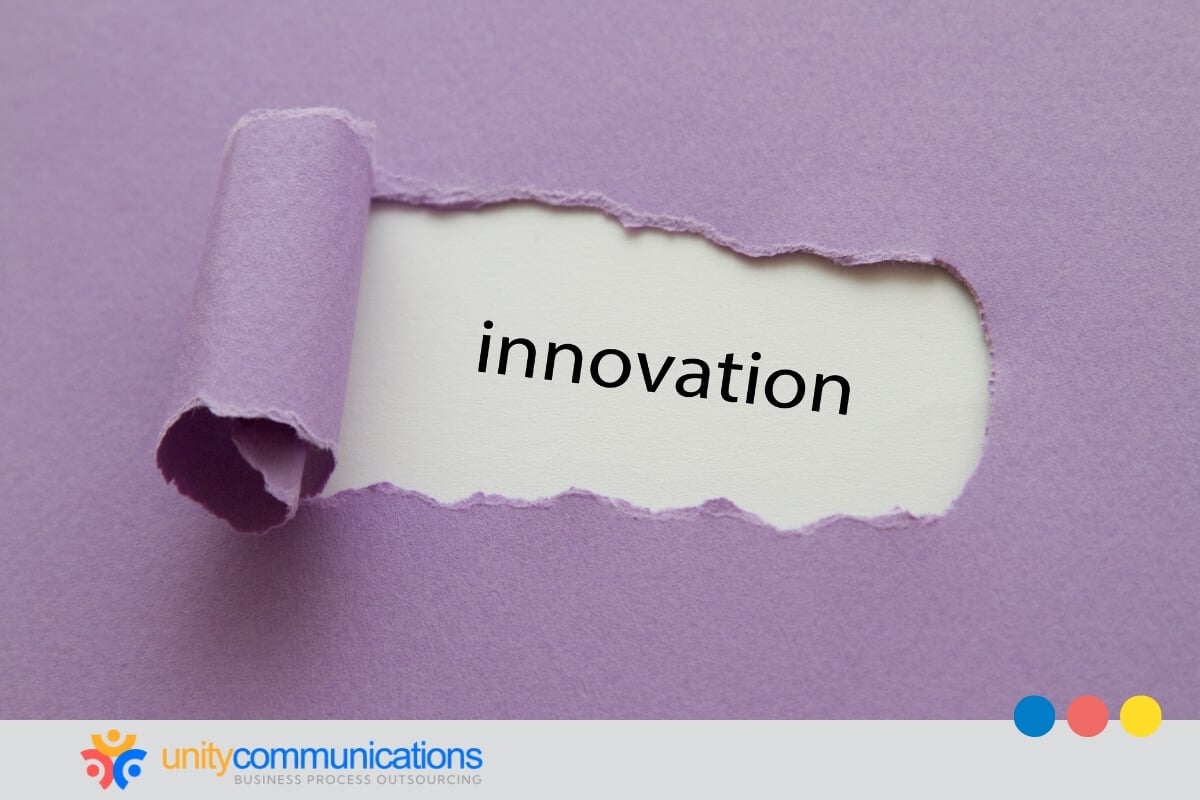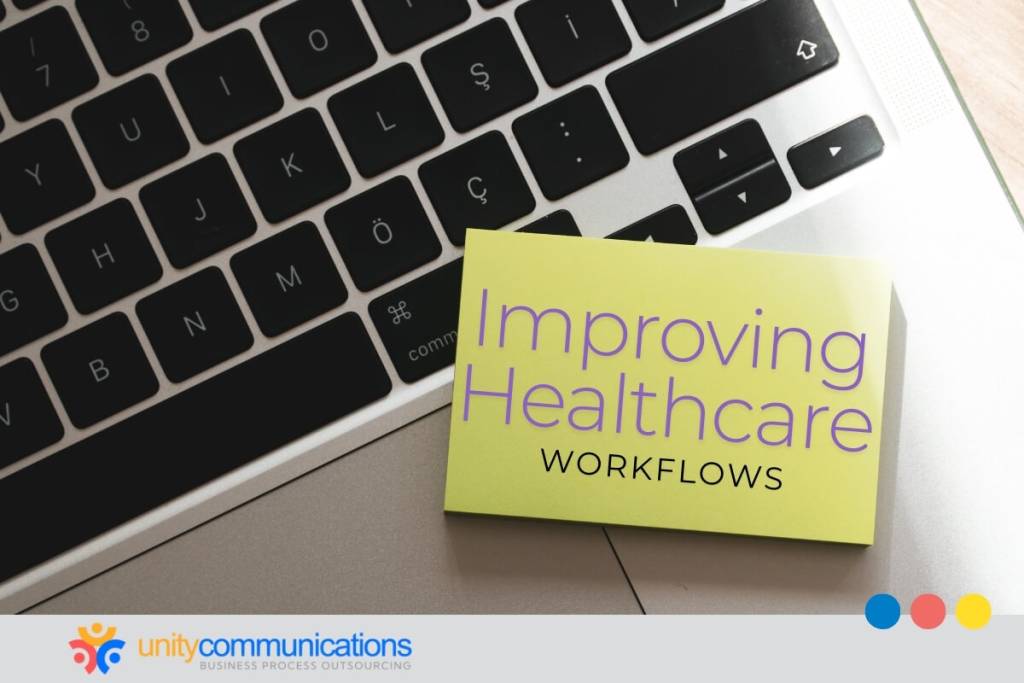IN THIS ARTICLE
Table of Contents
The modern healthcare industry is constantly pressured to deliver high-quality services quickly. However, staffing shortages and limited scalability can hinder medical facilities from meeting this demand.
Hiring virtual medical assistants through business process outsourcing (BPO) is an emerging strategy healthcare providers embrace to achieve this goal. In fact, 82% of businesses that outsource report enhancing operational efficiencies.
If you want to improve your healthcare practice’s workflows with virtual assistant services, this article is for you. It explores how they can support you in achieving this goal.
1. Increasing productivity through better access to specialized talent

Hiring virtual assistants is cost-efficient and boosts staffing for various administrative tasks. To better understand how this works, let’s first answer the question: What is BPO?
Business process outsourcing (BPO) involves delegating front- or back-office, non-core functions to a third party. The external team becomes extended staff and learns about your goals, policies, and workflows.
Service vendors allow clients to tap into a talent pool with unique skills tailored to the medical industry. Virtual medical assistants have the following technical skills and expertise:
- Communication skills (e.g., interpersonal and interpersonal skills, active listening skills, empathy, and best practices for clear communication)
- Medical terminology (e.g., complex medical terms, abbreviations, acronyms, and jargon in patient charts and healthcare records)
- Healthcare regulations (e.g., the Healthcare Portability and Accountability Act of 1996 [HIPAA], coding guidelines, and regulatory updates)
- Medical coding and billing (e.g., code assignments for diagnoses, procedures, and medical services, medical claims preparation and submission, and revenue cycle management)
- Telehealth platform proficiency (e.g., scheduling virtual appointments, collection of patient data for virtual visits, technical support, and meeting documentation)
- Electronic health records (EHR) proficiency (e.g., efficient input of patient data, patient record updates, and reporting)
Access to such specialization is advantageous for improving your healthcare practice’s workflows. Outsourcing administrative tasks in healthcare to virtual assistants lets you enjoy the following benefits that increase productivity:
Increased efficiency
Matching specific skills to tasks effectively uses resources. For instance, assigning a data analyst to a complex data project is more efficient than tasking a generalist with the same work. Addressing such skill gaps can reduce bottlenecks and improve your healthcare practice’s workflow.
This leads to faster time to market, resulting in a boosted competitive edge and better profitability. Deloitte’s 2023 Global Shared Services and Outsourcing survey supports this. According to the reports, 82% of businesses that engage in BPO services achieved their goals of enhancing efficiencies.
Enhanced quality
Due to their in-depth knowledge, virtual medical assistants are more likely to identify and correct potential errors. They also provide consistent and predictable outcomes, reducing the need for rework and thus increasing overall productivity.
For instance, a virtual assistant for Phoenix healthcare is aware of how common cyberattacks are in the city’s medical industry. Thus, they take the necessary steps to improve cybersecurity, such as encryption, employee training, and audits.
2. Boosting operational efficiency through process automation

As technology advances, virtual medical assistants’ role expands, further transforming medical service delivery. They revolutionize workflows in the healthcare industry by effectively automating routine administrative tasks.
BPO teams strategically combine their human expertise and cutting-edge technology to support medical care providers in delivering exceptional patient care. Let’s explore more about improving healthcare workflows through virtual assistants’ automation capabilities:
Technology-driven automation
BPO providers invest in the latest industry tools. How outsourcing works is your BPO partner leverages these technologies to accelerate your processes.
One critical automation method virtual assistants use is seamless software integration. They synergize with your practice’s management systems, EHRs, and insurance verification systems for efficient data transfer and processing.
BPO providers also employ specialized software and tools to automate repetitive and time-consuming tasks. These technologies include:
- Optical character recognition (OCR) software converts paper documents into digital format for more accessible storage and retrieval.
- Robotic process automation (RPA) tools automate data entry, form filling, and email management.
- Document management systems organize and store patient records electronically for easy access and retrieval.
- Artificial intelligence (AI) and machine learning (ML) analyze vast amounts of data to enable predictive analytics, pattern recognition, automated decision-making, and natural language processing.
Human expertise and process optimization
Although technology forms the backbone of automation, human expertise is still indispensable for achieving optimal results. BPO in telemedicine provides you with the power of both resources in the following ways:
- Standardization of procedures: Virtual medical assistants develop clear protocols for routine tasks for consistency, efficiency, and reduced decision-making time.
- Task prioritization: BPO teams prioritize tasks effectively based on urgency and importance, using task management tools.
- Communication and collaboration: Outsourcing providers leverage communication tools to effectively collaborate and streamline tasks.
Here’s an example of improving healthcare workflows with virtual assistants and cutting-edge tools: A virtual medical assistant trains artificial intelligence (AI) algorithms to recognize triggers for task urgencies. The AI can then prioritize prices based on this trigger, optimizing resource allocation.
Examples of tasks virtual assistants can automate
Equipped with innovative solutions, outsourcing teams can help your healthcare practice automate various routine and time-consuming processes:
- Appointment scheduling (e.g., automating appointment booking, rescheduling, and cancellations based on patient requests and provider availability)
- Patient intake (e.g., using online forms and automated data entry for patient verification to reduce paperwork and errors)
- Insurance verification (e.g., verifying insurance eligibility and benefits through integration with insurance databases)
- Medical records management (e.g., storing, retrieving, and updating patient information using EHRs and document management systems)
- Appointment reminders (e.g., sending automated appointment reminders via email, text messages, or phone calls to reduce no-shows)
- Billing and coding (e.g., automating claim generation and submission through integration with billing software and coding guidelines)
3. Empowering your medical practice to focus on core competencies

One significant benefit of healthcare BPO services is that it frees your practice’s internal team to attend to core activities. They help improve healthcare workflows by providing qualified virtual assistants to handle time-consuming processes and tools to automate repetitive tasks.
Unity Communications’s insurance verification case study perfectly illustrates this benefit. In the report, the BPO company helped a client medical facility reclaim 10 to 30 hours per week and elevate staff productivity, enabling them to focus on more complex responsibilities.
Here are a few ways focusing on your practice’s core competencies enhances workflow:
- Reduced bottlenecks: When healthcare providers focus on patient care, administrative backlogs are minimized, leading to smoother operations.
- Improved resource allocation: Matching the right resources to specific tasks enhances efficiency and reduces errors.
- Optimized workload distribution: Evenly distributing tasks among resources prevents overload and ensures timely completion.
- Faster turnaround times: Streamlined processes and reduced bottlenecks contribute to quicker completion of critical tasks.
- Improved decision-making: Focusing on core competencies allows healthcare providers to make well-informed decisions based on their expertise.
- Increased innovation: Attending to your practice’s core strengths helps identify opportunities to develop new services and improve patient-centric programs.
Ultimately, the healthcare process in BPO boosts patient experiences. With streamlined processes, they enjoy shorter wait times. When your internal team can focus on delivering quality care, patients improve their health outcomes.
However, choosing the right virtual assistant is key to maximizing these benefits. A skilled, experienced, and technology-proficient remote professional can deliver high-quality support.
The bottom line
Improving your healthcare practice’s workflows can be simple with the help of virtual medical assistants. They have the expertise and technologies to effectively streamline processes without compromising quality.
By effectively combining technology and human expertise, they empower you to optimize workflows and focus on delivering exceptional patient care. These benefits translate to increased patient satisfaction and a competitive edge in the fierce healthcare industry.
If you’re interested in hiring virtual medical assistants or engaging in healthcare outsourcing services, let’s connect!





